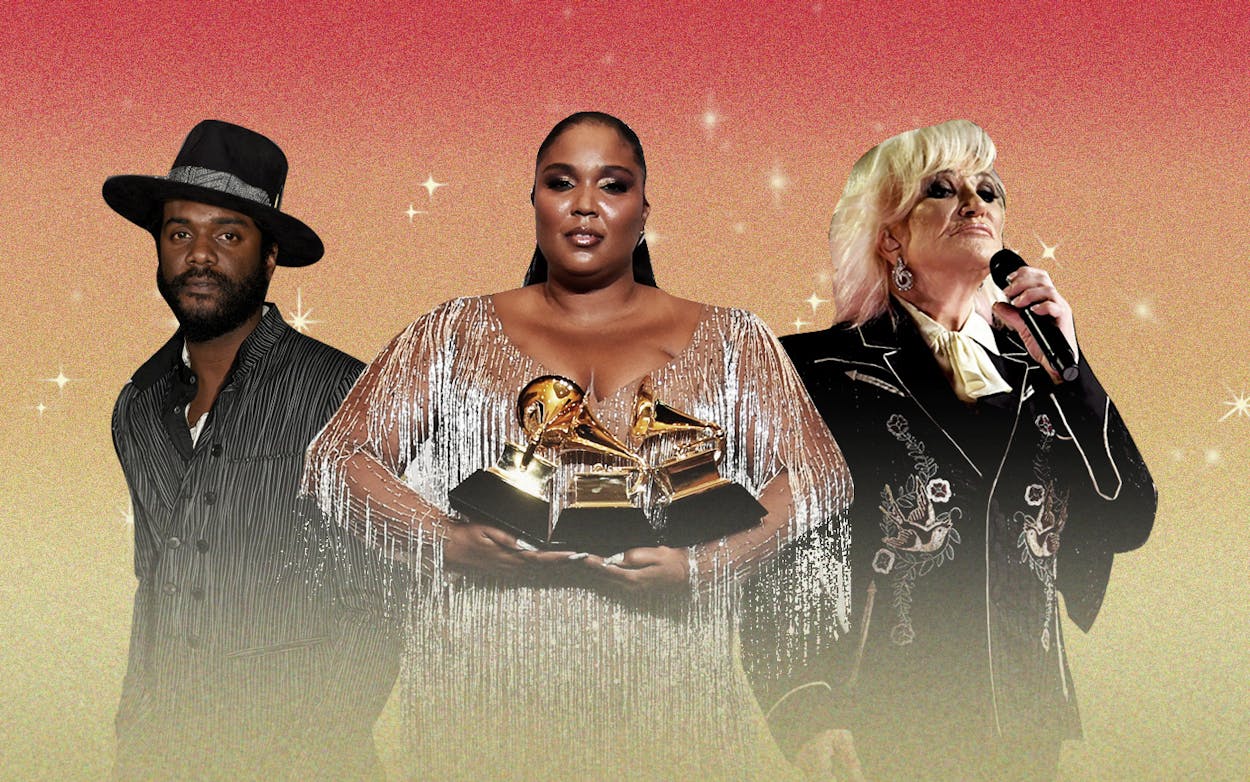The least cool major award show in the country, the Grammys, once again celebrated our coolest artists on Sunday night. That tension lies at the heart of the event, which pits incomparable talents against one another in an attempt to determine who’s objectively more deserving of an award like Song of the Year. This year, alternative pop artist Billie Eilish swept the four major awards categories, including Album of the Year, becoming only the second artist to do so—the first was San Antonio native Christopher Cross, who sailed to success at the same ceremony back in 1981.
Musical taste is idiosyncratic and personal, and determining whether Eilish’s “Bad Guy” is a better record than, say, Khalid’s “Talk,” Lizzo’s “Truth Hurts,” or Post Malone’s “Sunflower” is inherently subjective, an attempt to quantify the unquantifiable. And while several Texas stars took home awards, including Lizzo and Gary Clark Jr., our state particularly dominated in the performances peppered throughout the ceremony.
The most genuinely moving of the evening’s performances didn’t come from a current chart-topper or an artist nominated in a half-dozen categories, but rather from someone who has been open about going through a difficult time recently. Demi Lovato’s performance of her new song “Anyone,” accompanied by only a piano and her stunning vocals, reintroduced the Dallas-raised musician to the world following her well-publicized struggles with addiction.
Demi Lovato performing her new single “Anyone” at the #GRAMMYs pic.twitter.com/XDlmLSQhZc
— Demi Lovato News (@demetriaaalove) January 27, 2020
“Anyone” isn’t a song about overcoming something, making it a rarity among the ballads that singers often bring to the Grammy stage. The victory it signals is that its singer was there to perform it at all. And at an event like the Grammys, where performances that aim for “powerful” often veer into “corny” (see: Usher’s Prince tribute), Lovato turned the moment into something memorable.
Not every song translates to the Grammys stage so effectively. Gary Clark Jr., who took home awards for Best Rock Performance, Best Rock Song, and Best Contemporary Blues Album for his This Land (and its eponymous single), played the song backed by the Roots. The song is Clark’s most impassioned single, a full-throated response to the racism that he’s experienced as a black man in America. But a performance in which Clark self-censors (dropping the “fuck you” and n-word in the chorus) is by definition going to feel limited. Still, the fact that Clark—flanked by flames and performing with a tuba keeping bass—brought even a muted rendition of “This Land” to the Grammys was something to witness.
When it comes to new arrangements of Texas pop hits, though, Lizzo—who opened the ceremony after declaring that “this night’s for Kobe,” referencing the high-profile basketball player who unexpectedly died Sunday—performed an impressive medley of her songs “Cuz I Love You” and “Truth Hurts” accompanied by a full orchestra (and occasionally a group of ballet dancers).
https://twitter.com/poptimeplay/status/1221601886287081472?ref_src=twsrc%5Etfw%7Ctwcamp%5Etweetembed%7Ctwterm%5E1221601886287081472&ref_url=https%3A%2F%2Fwww.stereogum.com%2F2071224%2Flizzo-grammys-performance-2020%2Fvideo%2F
Lizzo, like Eilish, was up for all of the night’s major awards. Despite being nominated in eight total categories, she took home only three awards—for Best Urban Contemporary Album (for Cuz I Love You), Best R&B Performance (for her song “Jerome”), and Best Pop Solo Performance (for “Truth Hurts”). The Grammys have long struggled to give black artists their due at the ceremony, awarding genre-defining acts like Lizzo with meaningless disclaimers like “Urban.” (Tyler, the Creator, who won the Grammy for Best Rap Album, addressed that history in his post-victory press conference.) Her performance proved why she’s one of the remarkable stars in the world, full stop.
The final Texan to take the stage at the Grammys was country stalwart Tanya Tucker, who also—somehow!—won the first two awards of her career at the ceremony for Best Country Song (“Bring My Flowers Now”) and Best Country Album (While I’m Livin’). Her performance of “Bring My Flowers Now,” while accompanied on the piano by Brandi Carlile, was a testament to persevering in an industry where artists like Tucker (who, 48 years after her breakthrough as a thirteen-year-old prodigy, had gone nearly two decades since charting on country radio) are routinely marginalized.
Her first hit ‘Delta Dawn’ at 13. What a story. What a voice. Tanya Tucker. #GrammyAwards pic.twitter.com/fLAg1Lu1Q9
— Rebecca Bond (@RebeccaBond007) January 27, 2020
The full list of winners includes a huge number of talented artists, including a lot of Texans: Willie Nelson took one home for Best Country Solo Performance; Kirk Franklin received two awards, for Best Gospel Performance/Song and Best Gospel Album; Delbert McClinton was awarded one for the Best Traditional Blues Album; and Patty Griffin won for Best Contemporary Folk Album.
Still, the entire Grammys ceremony this year occurred under a cloud of controversy. Former Recording Academy head Deborah Dugan filed an extensive EEOC complaint against the organization just days before the event, alleging not just sexual harassment but also a rigged, collusion-filled nomination and voting process. And Tucker’s performance came just days after some of the biggest female stars in country music—including Kacey Musgraves, last year’s Album of the Year winner—publicly decried sexism in that genre’s radio programming.
While the Grammys’ selection process and place in culture appear to be even more dubious than they’ve ever been, it’s ultimately the performances themselves that capture the hearts and minds of listeners. It’s what matters most in the ceremony—and Texans showed up to deliver.
- More About:
- Music
- Willie Nelson
- Patty Griffin
- Lizzo
- Gary Clark Jr.
- Demi Lovato








